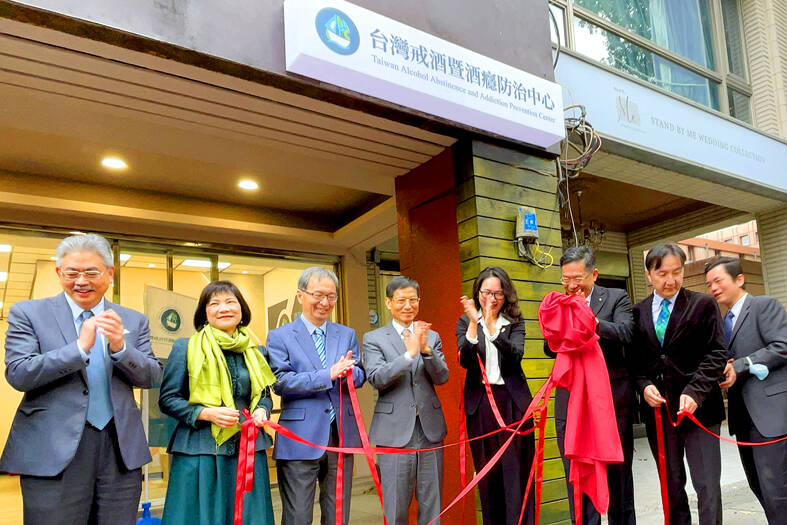The Ministry of Health and Welfare yesterday launched the nation’s first center to help alcoholics by providing consultation, screening and referral services.
The ministry commissioned Mackay Memorial Hospital to establish the Taiwan Alcohol Abstinence and Addiction Prevention Center, as more than 1 million of the 8 million drinkers in Taiwan engage in binge drinking.
Launching the center is part of the ministry’s effort to prevent alcoholism, which also includes introducing a set of safe consumption standards and providing medical subsidies to encourage quitting, Minister of Health and Welfare Hsueh Jui-yuan (薛瑞元) said.

Photo: Chiu Chih-jou, Taipei Times
A budget of NT$40 million to prevent alcohol addiction has been allocated this year and is to increase annually, he said.
Excessive drinking leads to about 4,500 deaths every year and incurs losses for 110,000 people, Department of Mental Health Director Chen Liang-yu (陳亮妤) said.
About 40,000 people become ill due to excessive drinking every year, costing about NT$3.5 billion in medical expenses and economic losses of nearly NT$54.9 billion, she said.
In 2021, 30.6 percent of senior-high and vocational high-school students reported consuming alcohol, up from 28.6 percent in 2019, she said.
The percentage of alcohol-drinking young women has also increased, she said.
According to the UN and the WHO, which have listed prevention and treatment of substance abuse as important implementation goals, every US$1 invested in prevention and treatment of alcoholism delivers US$10 in return, she said.
Taiwan has been implementing alcoholism prevention and treatment strategies for the past 17 years, helping 90 percent of cases reduce the frequency or amount of drinking, she said.
The ministry provides a subsidy of NT$40,000 per person per year to treat alcoholism, which can be sought at 135 facilities across the country, she said.
The center is to boost health literacy and support local research on alcohol addiction, which can be referenced by policymakers, she said.
Mackay Hospital is experienced in preventing alcoholism and has helped more than 700 alcoholics return to work in the past seven years, hospital superintendent Chang Wen-han (張文瀚) said.
People who are unable to control the amount they drink should seek professional consultation and assessment, said center director Fang Chun-kai (方俊凱), who is a psychiatrist at the hospital.
Unlike Taiwanese, Japanese are more conscious about self-protection when it comes to drinking and are more aware of how to protect their brain and liver before and after drinking, Fang said.
Taiwanese should learn to drink in moderation, discourage the culture of persuading people to drink and raise awareness about self-protection, he said.
The center is to provide face-to-face, phone and online consultations for people who have drinking problems and want to seek treatment, and transfer them to the most suitable institutions after assessments, he said.
It would help build a more comprehensive system for alcohol addiction treatment by conducting research and providing personnel training, he added.

The Grand Hotel Taipei on Saturday confirmed that its information system had been illegally accessed and expressed its deepest apologies for the concern it has caused its customers, adding that the issue is being investigated by the Ministry of Justice Investigation Bureau. The hotel said that on Tuesday last week, it had discovered an external illegal intrusion into its information system. An initial digital forensic investigation confirmed that parts of the system had been accessed, it said, adding that the possibility that some customer data were stolen and leaked could not be ruled out. The actual scope and content of the affected data

‘LIKE-MINDED PARTNER’: Tako van Popta said it would be inappropriate to delay signing the deal with Taiwan because of China, adding he would promote the issue Canadian senators have stressed Taiwan’s importance for international trade and expressed enthusiasm for ensuring the Taiwan-Canada trade cooperation framework agreement is implemented this year. Representative to Canada Harry Tseng (曾厚仁) in an interview with the Central News Agency (CNA) said he was increasingly uneasy about Ottawa’s delays in signing the agreement, especially as Ottawa has warmed toward Beijing. There are “no negotiations left. Not only [is it] initialed, we have three versions of the text ready: English, French and Mandarin,” Tseng said. “That tells you how close we are to the final signature.” Tseng said that he hoped Canadian Prime Minister Mark Carney

POSITIVE DEVELOPMENT: Japan and the US are expected to hold in-depth discussions on Taiwan-related issues during the meeting next month, Japanese sources said The holding of a Japan-US leaders’ meeting ahead of US President Donald Trump’s visit to China is positive news for Taiwan, former Japan-Taiwan Exchange Association representative Hiroyasu Izumi said yesterday. After the Liberal Democratic Party’s landslide victory in Japan’s House of Representatives election, Japanese Prime Minister Sanae Takaichi is scheduled to visit the US next month, where she is to meet with Trump ahead of the US president’s planned visit to China from March 31 to April 2 for a meeting with Chinese President Xi Jinping (習近平). Japan and the US are expected to hold in-depth discussions on Taiwan-related issues during the

President William Lai (賴清德) yesterday bestowed one of Taiwan’s highest honors on Saint Vincent and the Grenadines (SVG) Ambassador Andrea Clare Bowman in recognition of her contributions to bilateral ties. “By conferring the Order of Brilliant Star with Grand Cordon on Ambassador Bowman today, I want to sincerely thank her, on behalf of the Taiwanese people, for her outstanding contribution to deepening diplomatic ties between Taiwan and SVG,” Lai said at a ceremony held at the Presidential Office in Taipei. He noted that Bowman became SVG’s first ambassador to Taiwan in 2019 and